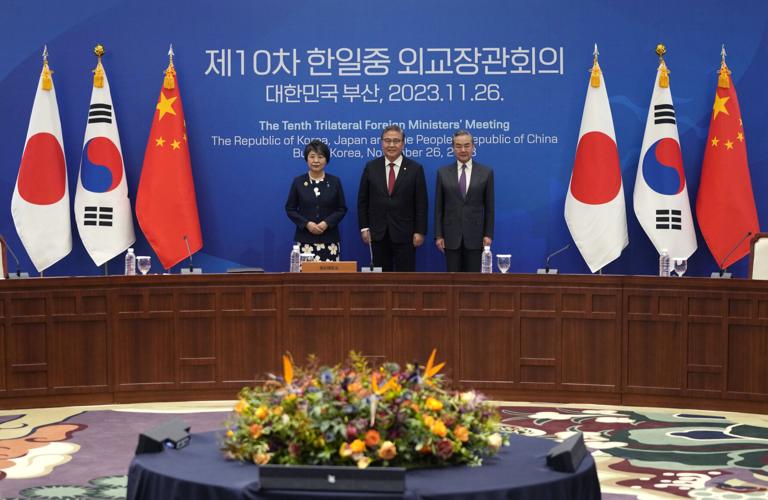

After a lapse of approximately four years, the chief diplomats from South Korea, Japan, and China reached an agreement on Sunday to rejuvenate cooperation among the Asian neighbors and recommence their trilateral leaders’ summit. However, no specific timing for the summit’s resumption was specified.
Interconnected economically and culturally, the trio collectively contributes to approximately 25 percent of the global gross domestic product. However, attempts to enhance cooperation have encountered obstacles, influenced by a combination of factors such as historical disputes rooted in Japan’s wartime aggression and the strategic competition between China and the United States.
The three ministers have concurred on the expeditious restoration and normalization of tripartite cooperation,” stated the South Korean Foreign Minister to reporters following the meeting with Japan’s Yoko Kamikawa and China’s Wang Yi in Busan, South Korea
Park mentioned that the three ministers reaffirmed a prior accord made by lower-level officials to resume the summit ‘at the earliest mutually convenient time’ and committed to hasten preparations for the meeting. Kamikawa, in a separate statement, indicated that the ministers had concurred to accelerate efforts to realize the summit ‘at an early and appropriate timing.
The three ministers additionally committed to advancing diverse cooperation projects in domains such as people-to-people exchange, trade, technology, public health, sustainable development, and security, as outlined in statements from South Korea and Japan. The absence of an agreement on the timing for the trilateral summit suggests that the high-level gathering is unlikely to occur this year, as initially hoped by South Korea, the next summit’s chair. Nevertheless, Kamikawa remarked, I believe it is an important step toward achieving an upcoming Japan-China-South Korea summit.
Since their inaugural stand-alone trilateral summit in 2008, the leaders of South Korea, Japan, and China were initially slated to convene annually. However, the summit has experienced interruptions and delays since 2019, with Sunday’s meeting marking the first since that year.
South Korea and Japan, both crucial U.S. military allies, collectively host 80,000 American troops on their territories. Their recent efforts to bolster trilateral security cooperation with the United States have drawn objections from China, which is highly sensitive to perceived containment measures against its regional dominance. Despite tensions, some observers suggest that the conciliatory tone struck by Chinese President Xi Jinping and President Joe Biden in their recent face-to-face meeting could create diplomatic opportunities for Seoul, Tokyo, and Beijing to explore avenues to reinvigorate three-way cooperation.
After her meeting with Wang on Saturday, Kamikawa reiterated Japan’s insistence that China lift its ban on seafood imports from Japan, a response to Tokyo’s discharge of treated radioactive wastewater from its tsunami-damaged nuclear power plant.
Wang, on his part, expressed China’s opposition to Japan’s ‘irresponsible action’ of releasing wastewater and called for an independent monitoring mechanism for the process, as reported by the Chinese Foreign Ministry.
In recent years, ties between South Korea and Japan had significantly deteriorated due to issues stemming from Japan’s colonization of the Korean Peninsula from 1910-1945. However, relations have thawed in recent months, marked by significant steps to move beyond historical grievances and enhance cooperation in addressing shared challenges, including North Korea’s nuclear program.
In a stark reminder of their strained relations, a Seoul court recently ordered Japan to provide financial compensation to Koreans compelled into sexual slavery by Japanese troops during the colonial period. During her meeting with Park earlier on Sunday, Kamikawa expressed her dismay at the court verdict, deeming it ‘extremely regrettable’ and urging South Korea to address the breaches of international law, as reported by Japan’s Consulate in Busan.
South Korea’s Foreign Ministry stated that the ministers deliberated on the court ruling and explored ways to collaboratively revitalize three-way cooperation with China. Both ministers strongly condemned North Korea’s spy satellite launch the previous week.
Additionally, Park urged Wang for China to play a constructive role in persuading North Korea to cease provocations and take steps toward denuclearization, according to South Korea’s Foreign Ministry. In response, Wang characterized China as ‘a stabilizing force’ in the region, emphasizing its commitment to playing a constructive role in easing tensions on the Korean Peninsula, as noted by the Chinese Foreign Ministry.